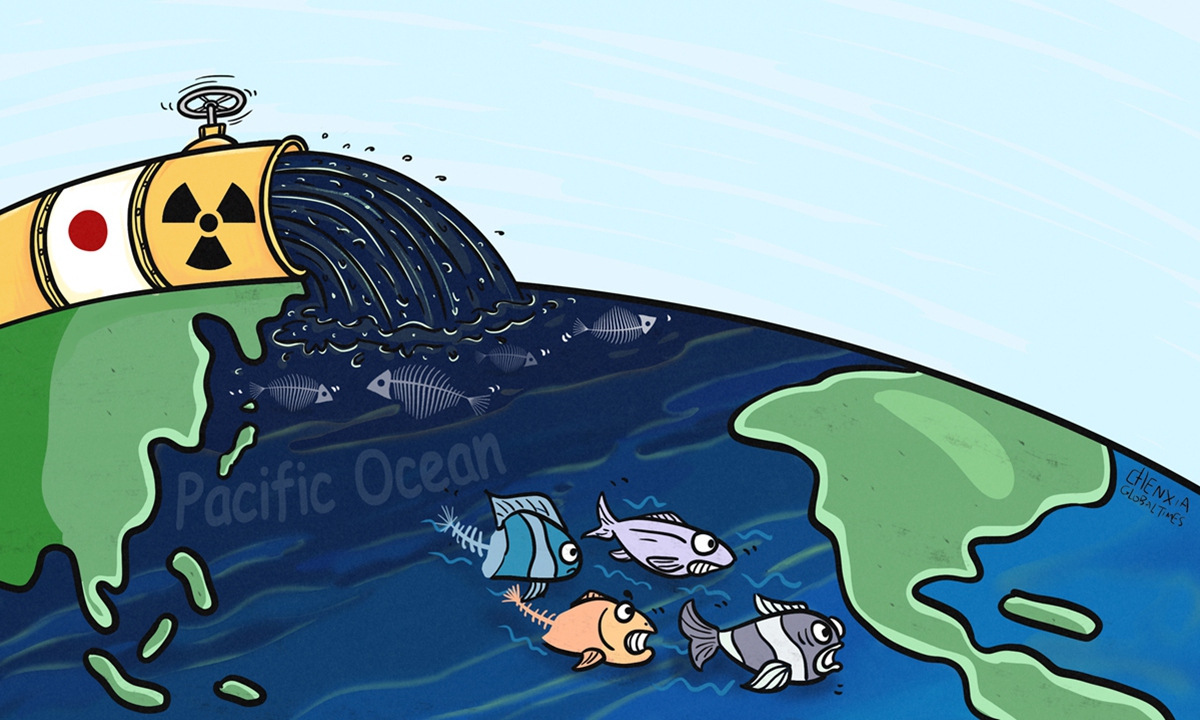
Illustration: Chen Xia/GT
As the Chinese people enjoy the Mid-Autumn Festival and the National Day holidays, some Japanese media outlets are hyping up the break. The Japan Times began to intensively talk up news, including "Japanese airlines' flights from China almost fully booked for holiday" and "Japan tops the list of popular overseas destinations for Chinese travelers during the vacation period," before the week-long holidays began. They also forcefully connected this with the attitude of the Chinese people toward Japan's dumping of nuclear-contaminated wastewater into the sea, deliberately creating misleading arguments such as that Chinese people are "forgetful" or "do not care about Japan's dumping."
Since the beginning of the dumping, Japan has been using various means of public opinion to fool the public. This time, the Japanese media used the "Golden Week" as a pretext to mislead the public. It is necessary to use facts to further dismantle the Japanese media's public opinion warfare and even false propaganda and make the world realize better the irresponsible practice of Japanese public opinion and even officials on the issue of nuclear-contaminated wastewater dumping.
First, some Japanese media outlets have deliberately blurred the distinction between ideas to confuse the public. Speaking of this "Golden Week," they linked various reasons behind the surge of Chinese visitors in Japan, including the fact that China resumed Japan-bound group tours, the demands for business trips and visiting family members are growing, and October is when foreign students enroll in Japanese colleges. They generalized "Chinese people traveling to Japan" as "Chinese tourists," ignoring the fact that the passengers include a large number of business people and students, and even some Japanese citizens are on these so-called "packed" flights to Japan.
Second, these Japanese media outlets are using "tourism public opinion warfare" to muddle through and downplay their country's responsibility in wastewater dumping, as they link the "Chinese visitors to Japan" with the issue of Japan's dumping of nuclear-contaminated wastewater into the sea. Several media outlets interviewed "Chinese tourists arriving in Japan" at the airport and tried to prove that "Japan's dumping does not have a great impact on tourism" by hiding the identity and muting the voices of the interviewees. This all aims to deliberately create an impression that "the Chinese people are contradicting themselves" - Chinese people's condemnation of Japan does not really affect their willingness to travel to Japan.
But in fact, leaving aside the widespread opposition and condemnation of the international community, including China, after Japan began the dumping on August 24, if we only look at the Chinese tourism data before the "Golden Week" holidays, it reveals that many Chinese people did seek to travel abroad, but Japan is not as popular destination as the Japanese media is portraying, with few group tours from China. This has made people suspect that the Japanese media is focusing on part of reality to distort the big picture deliberately, fabricating the "Chinese tourist boom in Japan" to dilute, muddle through, and shirk Japan's responsibility in dumping nuclear-contaminated wastewater.
Third, what Japanese media outlets wanted to create is the disinformation that "Chinese people do not care about Japan's nuclear-contaminated wastewater dumping" and that "Chinese people are forgetful." But it is obviously a baseless argument, because it is far-fetched and very dangerous to anticipate that the recovery of bilateral tourism as well as the growing desire for study, business, and other people-to-people exchanges can justify the country's wastewater dumping action.
In recent days, quite a number of Japanese media outlets also took advantage of the participation of Japanese Minister for Science and Technology Policy Sanae Takaichi in the General Conference of the International Atomic Energy Agency last week to build up momentum for the dumping of nuclear-contaminated wastewater to push a narrative that Japan's move is gaining general understanding and growing support from the international community, except for China's opposition. But such nonsense cannot hide the fact that Japan's dumping is not only strongly opposed and criticized by the people of many countries, such as China, South Korea, and Southeast Asian nations, but also raised concerns from other members of the international community, such as Pacific Island countries. Even in Japan, many people, including fisheries organizations, have objections and concerns about Tokyo's decision.
It must be said that some Japanese media outlets have been doing the same type of thing to provoke certain sentiments or even directly advance reporting based on disinformation. However, the Japanese government's decision to dump nuclear-contaminated wastewater into the sea has, in fact, led to a rise in marine nuclear pollution level and the occurrence of "broken windows" in international law, and Japanese people are generally worried that this will seriously damage Japan's international image. At this point, the Japanese media should fulfill the ethical responsibility of a conscientious side and urge Tokyo to face up to and correct its approach to this matter, rather than "helping it to do harm." After the first round of wastewater dumping, the Japanese government should also take into account the concerns of neighboring countries, face up to its own responsibility, immediately stop the subsequent dumping plan, and remedy the consequences which are already unfolding.
The author is director of the Institute of Northeast Asian Studies at the Heilongjiang Provincial Academy of Social Sciences. opinion@globaltimes.com.cn
